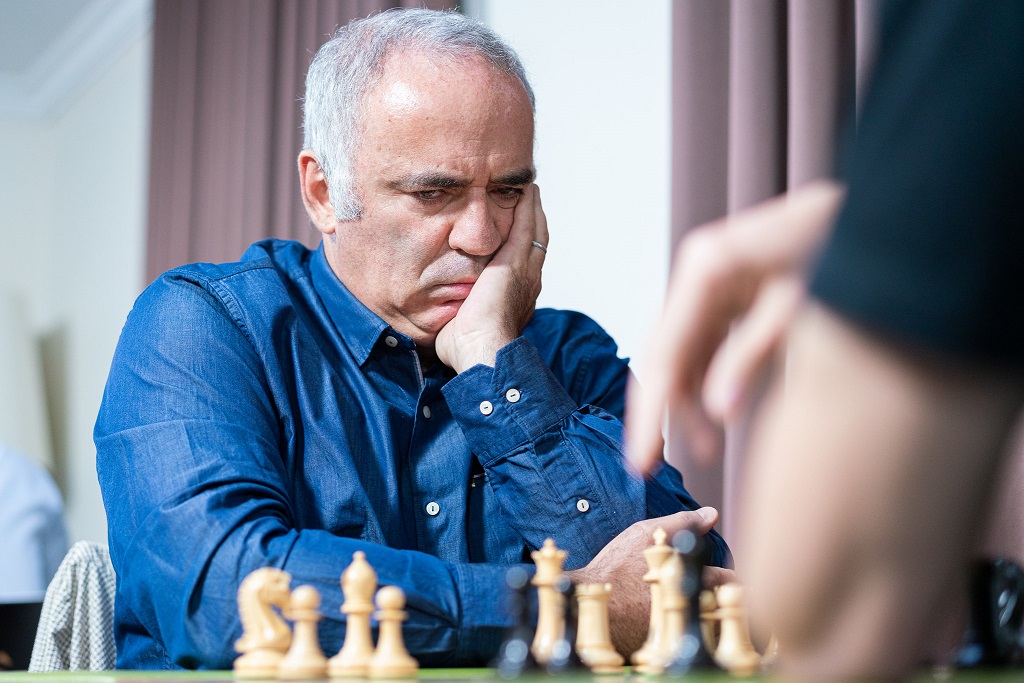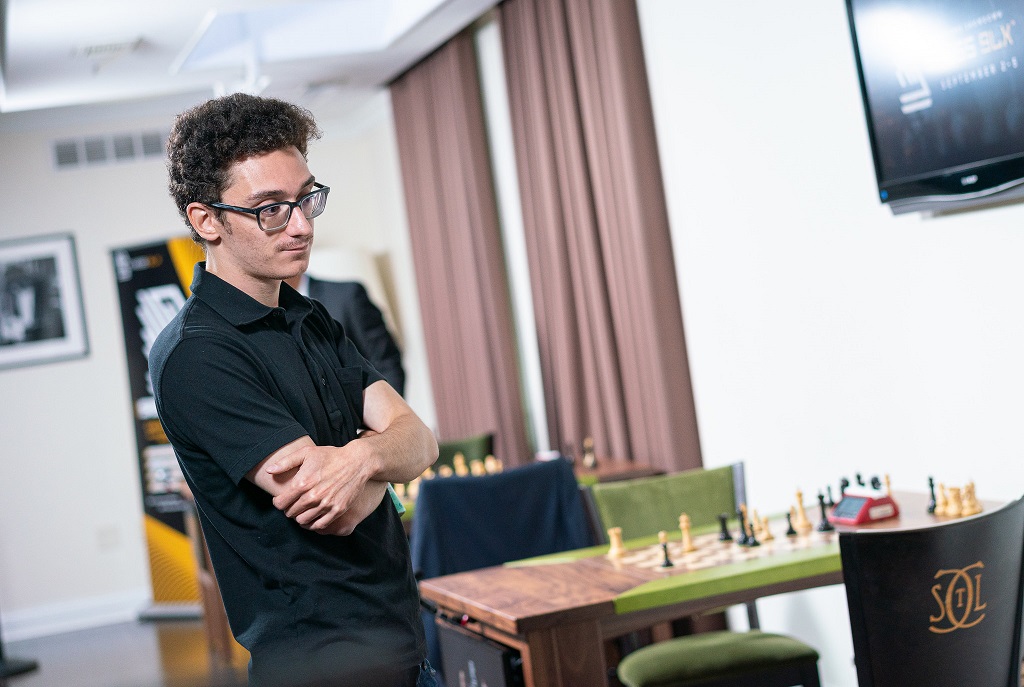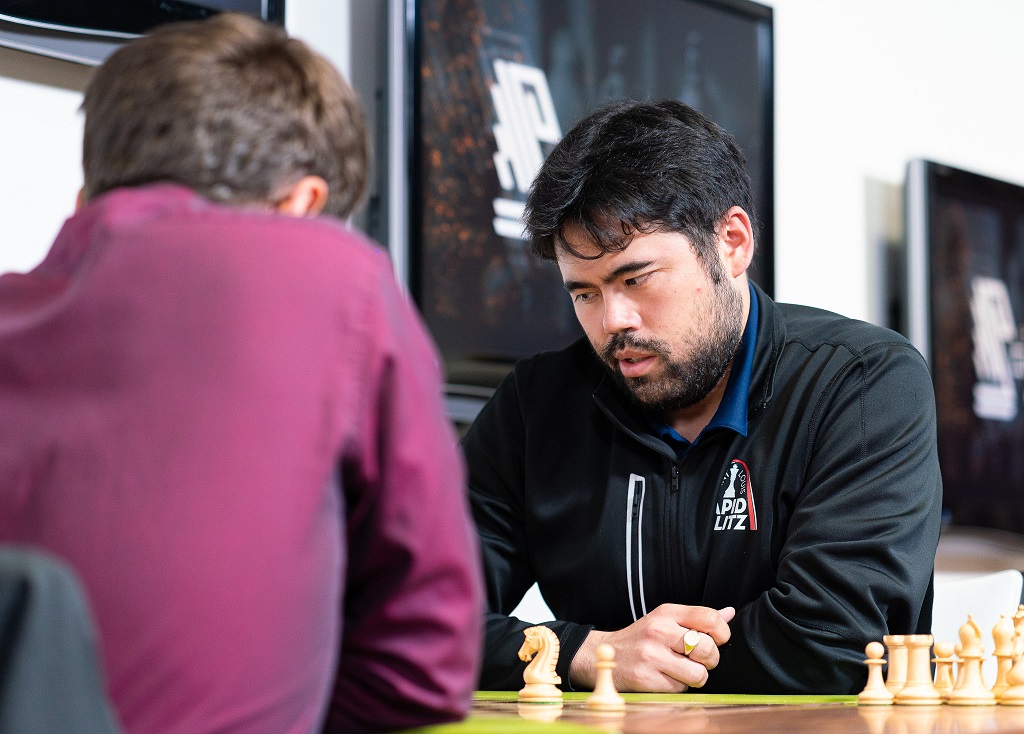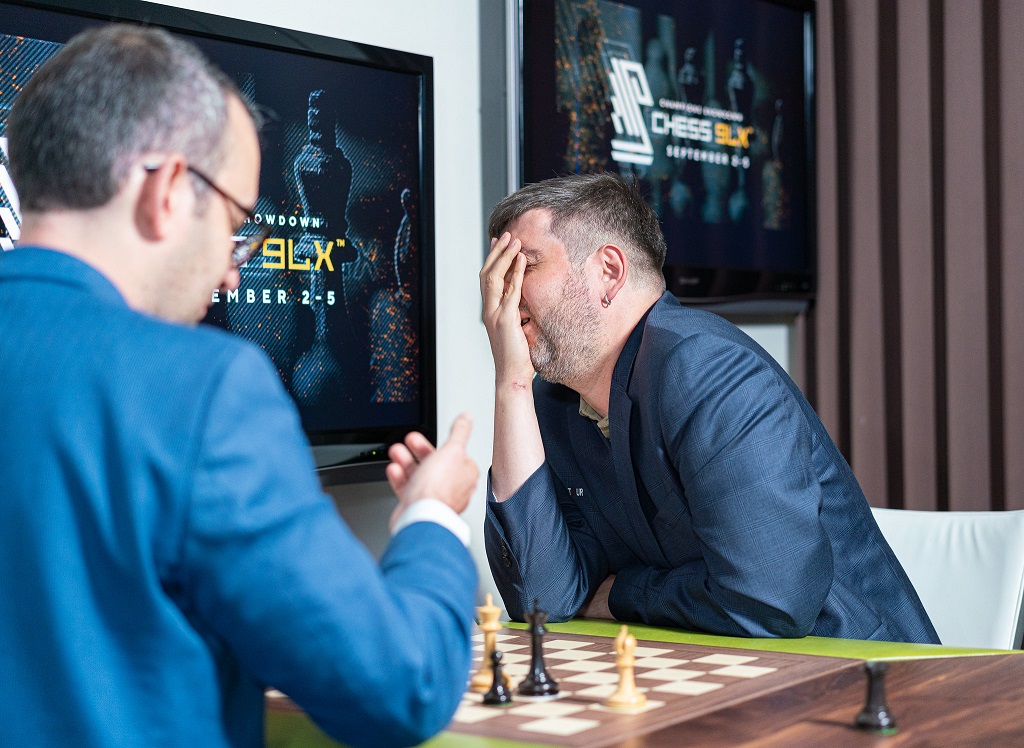


ChessBase 17 - Mega package - Edition 2024
It is the program of choice for anyone who loves the game and wants to know more about it. Start your personal success story with ChessBase and enjoy the game even more.
Chess 9LX, or Chess 960, or Fischer Random Chess, as it was originally called, is a variant where the pieces on the first row are placed in random, thus nullifying the effect of opening preparation and pattern recognition in playing a game (960 denotes the total number of random setups theoretically possible in the initial position).
The format in Saint Louis stipulates that a new starting position must be drawn every four rounds, which means all sixteen games played on day one had the same setup at the outset. On Monday, the position had both knights "on the rim" — i.e. on the a and h-files — and the bishops dangerously pointed at the opponent's queenside. Therefore, as the kingside pawns needed to advance quickly in order to open up the diagonals for the bishops, an early development of the queenside knights with ♘b3 and ♞b6 was the norm on most boards.
Once the position was drawn, the players had one hour to prepare before the games — not with any sort of electronic device but together with some other participant. Garry Kasparov studied the setup with his compatriot Peter Svidler; Hikaru Nakamura partnered up with Wesley So; Veselin Topalov looked at the piece configuration with Leinier Dominguez; and Fabiano Caruana teamed up with Levon Aronian.
Two rounds of rapid (30 minutes plus 10-second delay) and two rounds of blitz (5 minutes plus 5-second delay) were in store.

Leinier Dominguez, Veselin Topalov and Hikaru Nakamura in high spirits during the pre-game meeting | Photo: Lennart Ootes
The legend from Baku started with White and finished game one on the better side of a 42-move draw. Caruana established a sort of Leningrad variation of the Dutch Defence, with both players castling kingside. Eventually, time management played an important role in this encounter — and throughout the day — as the former world champion found himself hurried by the clock, most likely due to the lack of practice. Had he preserved more time on the clock, perhaps he would not have allowed his opponent to find the repetition that led to the draw.
Game two followed, and it was the turning point of the match-up. Apparently, Caruana thought he had to use his chances with White and played rather loosely, leaving his king uncastled and defyingly opening lines left and right. Kasparov, true to his nature, responded in kind, working to get the most of his initiative on the queenside until achieving a clearly winning position. But then disaster struck:
The Aggressive Classical Dutch for Black
The Dutch (1.d4 f5) is known as a very aggressive and unbalanced opening, resulting in the lowest percentage of draws among the most common replies to 1.d4 . The opening became popular during the 1951 World Championship match, where both players tried it successfully. Today, players known for spectacular attacking chess are using the opening as a dangerous, surprise weapon.
As Kasparov himself mentioned afterwards, pretty much any move wins for Black here — 30...♜e3, 30...♜d2; even 30...♚b8 or 30...h5 maintain the advantage. But not 30...♝xb2, the move chosen by the Russian. After 31.♖c5 ♛b4 32.♖xa5+, White is not only out of trouble...he is now completely winning. Kasparov resigned after 32...♚b6 33.♖a4 ♛b3 34.♕xb2.
Venkatachalam Saravanan is in Saint Louis and reported:
Just when Caruana is deciding to capture the a5-pawn with his queen or the rook, out came the famous Kasparov facial gestures and self-contempt, muttering to himself and throwing up his head up in disgust. The rest was a picture in the great man being disappointed with himself and bewildered on what had just happened. The histrionics are a treat to watch, though you can't help but admire the man's passion too.
The 13th world champion was devastated and could not recover from such letdown. He got a good position in the first blitz game, but quickly collapsed and lost after 38 moves. Finally, in the last encounter of the day, Caruana took advantage of his rival's reckless play to get a clear 23-move victory.

Fabiano Caruana will not have it easy against his retired opponent | Photo: Lennart Ootes
When the four rounds were over, Aronian talked to Maurice Ashley — while sporting flashy red shoes — and simply stated that his opponent had had "an off-day", which clearly illustrates what transpired in their match-up.
In game one, Nakamura had White and castled long on move 19 — curiously, the only time either of the contenders of this match castled on Monday, as the creative nature of both was on display the whole four rounds. The American eventually gained a piece, but Aronian had a strong initiative against the white king. The position was tensely balanced, until Nakamura blundered into a nice mating net:
The Chess Player's Mating Guide Vol.1 and The Chess Player's Mating Guide Vol.2
The attention will be paid to the castled king and in particular on ways of exploiting the weakened kingside. Several well-known themes, pawnformations and other attacking weapons are covered in 8 chapters.
Nakamura's 39.bxc5+ leaves the king defenceless. Black did not recapture but played 39...♚a6 instead, and after 40.♕f4 came the killer blow — Black to play and mate-in-two:
40...b5+ and White resigned.
Much like Kasparov, Nakamura could not recover from such upsetting one-move error, and went on to lose the following two encounters. Particularly heartbreaking — therefore Aronian's statements mentioned above — was the American's loss in game three, as his queen was trapped as early as move 13 (Nakamura resigned in what was clearly the shortest game of the day).
In fact, Aronian could have easily achieved a whitewash over the U.S. Champion, but the Armenian could not make the most of his favourable position in the last game of the day.

Hikaru Nakamura is totally capable of bouncing back | Photo: Lennart Ootes
These two household names of the elite have frequently played together, as Svidler is the long-time leader of Saint Petersburg's Mednyi Vsadnik, and Dominguez has been part of said squad in multiple European or Russian team events.
The key factor in this match-up was the difference in time management. Svidler, the older of the two, in fact handled his clock better than his opponent. The Russian later stated that he was not aware of the fact that this was one of Dominguez's weak points, but that did not prevent him from creating a three-point gap in his favour before day two.
Game one was tense throughout. Dominguez, with White, was the one pushing in the middlegame, but Svidler kept things under control and even got to simplify into a superior ending. The Russian star went on to painstakingly convert his material advantage (he was a pawn up), but could not find the easiest of moves in the end:
Chess Endgames 9 - Rook and Minor Piece
Endings with rook and minor piece against rook and minor piece occur very frequently, even more often than rook endings, yet there's not much literature on them. This endgame DVD fills this gap. The four different material constellations rook and knight vs rook and knight, rooks and opposite coloured (and same coloured ) bishops and rook and bishop vs rook and knight are dealt with. In view of the different material constellations Karsten Mueller explains many guidelines like e.g. "With knights even a small initiative weighs heavily".
After doing all the hard work, Svidler gave away the win with the inexplicable 87...♚g3, when 87...♞g2 is a move most club players would find in a heartbeat. The draw was signed after 88.♔xe3, and Dominguez immediately pointed out the mistake to his colleague. Svidler was shocked, but later confessed that he did not feel too bad as he had a bad position out of the opening.

Leinier Dominguez just told Peter Svidler what he had missed | Photo: Lennart Ootes
In the second rapid encounter, Svidler got the upper hand as early as move 4 — the Cuban-born grandmaster played 1...e5, 2...d5 and 3...f6, leaving the h3-c8 diagonal wide open for White's bishop to attack (let us not forget that the kings were placed on the c-file). The Russian got the full two points — rapid games are worth twice as much — after 31 moves.
Svidler won the first blitz game in 43 moves and the players split the last point after 65.
Another clash of generations, much like Kasparov v Caruana, saw the veteran player getting low on time chronically throughout the day. Furthermore, after having enjoyed a slightly better position for most of game one, Topalov gave away the first two points of the match-up to his opponent by losing on time — the Bulgarian only plays sporadically nowadays, so the lack of practice is also a factor in this case.
Game two was a draw, in which, once again, Topalov let go of some small chances. So's second win came in the first blitz encounter, but Topalov bounced back with a victory in the final game of the day...only after So missed a huge chance to get a larger advantage on the score board:
The aim of this course is to help you understand how to make tactical opportunities arise as well as to sharpen your tactical vision - these selected lectures will help to foster your overall tactical understanding.
Two obvious checks are screaming to be played: 21...♛f1+ wins after 22.♖e1 ♜d1+ 23.♖xd1 ♛xd1+, while after 21...♜d1+ (played in the game) there follows 22.♔a2 ♛f1 23.♖e8+ ♚d7 24.♖d3+:
After having missed the win, So blundered again by opting for 24...♚xe8 here, allowing White to go on the attack with 25.♕e5+ ♝e7 26.♕h5+ g6 27.♕xd1 ♛xg2 28.♕e1, etcetera. Topalov showed he knows how to handle the initiative and won in 66 moves.

Wesley So | Photo: Lennart Ootes
Commentary by WGM Jennifer Shahade, GM Yasser Seirawan & GM Maurice Ashley